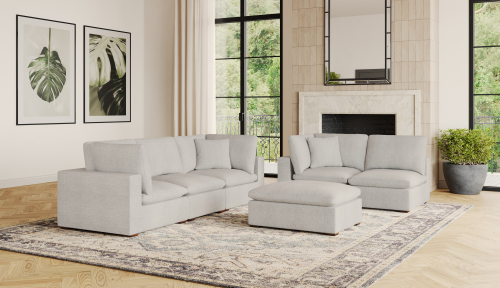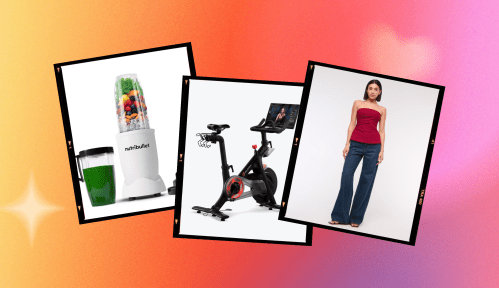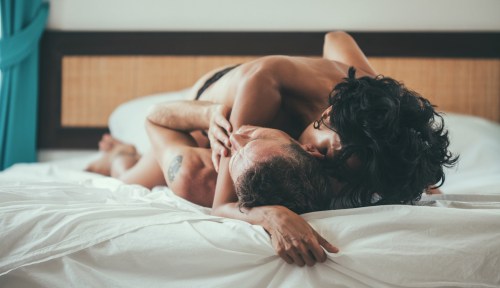Our editors independently select these products. Making a purchase through our links may earn Well+Good a commission
He may not have realized it, but my grandpa unintentionally lived his life like a wellness influencer before the concept ever existed. He started every morning by plunging into his frigid upstate New York swimming pool. (DIY cryotherapy!) He never turned down a Nutty Buddy ice cream cone, no matter the time of day or time of year. (Intuitive eating!) And I never saw him leave the house without his BluBlockers, the original blue-light-blocking glasses, long before anyone was asking, “Do blue-light glasses work, or are they just a scam?”
To jog your ’90s infomercial memories, BluBlockers are aviator-style sunglasses with orange lenses that block out all UV rays and the blue wavelength of light. The guiding premise here is that filtering out blue light from your field of vision can make objects appear clearer because blue-light waves are shorter and more scattered than other visible light frequencies. Well, fast-forward a few decades, and a new iteration of these specs are trending again for a different reason: We’re surrounded by devices that emit blue light from their screens, which, according to some research and sources, can sabotage sleep, contribute to headaches, strain eyes, and promote fatigue with extended exposure.
Now brands like Felix Gray, Quay, and Warby Parker offer more modern-looking frames optimized for screen time that are fitted with clear lenses you can wear without looking like a Bono wannabe (like these, these, and these). But, if you’re into that aesthetic, options from Blublox and TrueDark (like these and these) still feature the orange and yellow lenses, which are noted to filter out a higher percentage of blue light and are often worn at night to encourage deeper sleep. But the surge in market availability and popularity for these products does raise a major question: Do blue-light glasses work for the complex purpose of helping to solve issues like insomnia and migraines? Or is this just another wellness scam in the making?
The downsides—and benefits—of blue-light exposure
Blue light isn’t necessarily the menacing villain that some make it out to be. It’s produced naturally by the sun and actually has a few important biological purposes. “Blue light aids in regulation of our body’s natural clock and promotes alertness and memory,” says optometrist Danielle Richardson, OD, at Los Angeles vision lab Zak. “It plays a role in our color perception and can also improve our mood; it’s sometimes used as a therapeutic treatment for seasonal affective disorder.”
But blue light’s energizing effects may backfire when we’re subjected to it after dark. Fifty years ago, this rarely happened, but now that we spend our evenings gazing at LED devices like mobile phones, computers, tablets, and TVs, our exposure is higher than it’s ever been. “There is some evidence that blue light from screens may affect the body’s circadian rhythm, our natural wake and sleep cycle,” says Rahul Khurana, MD, clinical spokesperson for the American Academy of Ophthalmology. “Since blue light wakes us up and stimulates us, too much blue-light exposure late at night from screens can disrupt our ability to fall asleep.” As Dr. Richardson points out, chronic shortness of sleep can increase one’s risk for all sorts of conditions, including obesity, heart disease, anxiety, and depression.
Without more human research that measures the impact of everyday blue-light exposure from screens, it’s impossible to accurately say what the long-term implications are.
Studies have also linked blue light to dry eyes, cataracts, and age-related macular degeneration—although most of this research was carried out in vitro or on animals rather than on humans, which is something Dr. Richardson calls a pitfall of current knowledge available. “Key studies confirming retinal cell death after exposure to blue light have been conducted on rat and primate retinas, not human ones, thus leaving the findings open to scientific debate.” The amount of blue light used in these studies is also considerably higher than what’s emitted from a device, she adds. Without more human research that measures the impact of everyday blue-light exposure from screens, it’s impossible to accurately say what the long-term implications are.
So, do blue-light glasses work for filtering out problematic rays?
While there is some research connecting high doses of blue light with vision issues, the American Academy of Opthamology doesn’t consider it compelling enough to worry the average person. “Whether using a laptop, a cell phone, or a different electronic device, there is no scientific evidence that blue light from our screens causes lasting harm to our eyes,” says Dr. Khurana. As such, the Academy doesn’t recommend blue-light blocking glasses for computer use.
The blue light from your devices isn’t likely to seriously harm your eyes, but some find that reducing their exposure with glasses or other techniques can help ease the discomfort of extended screen time.
However, looking at a screen for too long can contribute to temporary eye strain, which may result in dry eyes, blurred vision, headaches, and fatigue. Devotees of blue-light blocking glasses often claim their specs help ward off these uncomfortable symptoms, but Dr. Khurana points out that there are plenty of other, free ways to ease the strain—namely, increasing the contrast on your screen, adjusting lighting in the room, and using rewetting eye drops. He also recommends following the 20-20-20 rule when you’re spending an extended period of time on a device: “Every 20 minutes, shift your eyes to look at an object 20 feet away for at least 20 seconds.”
Many people also contend that wearing blue-light glasses in the p.m. helps them sleep better at night, although research in this arena shows mixed results. Dr. Khurana says putting your devices on nighttime settings may offer a similar desired effect—as will powering them down two to three hours before bedtime—but keep in mind there are many other factors that impact sleep quality, aside from light exposure.
The takeaway? While the blue light from your devices isn’t likely to seriously harm your eyes, some people find that reducing their exposure with glasses or other techniques can help ease the discomfort of extended screen time. If you want to find out for yourself, clear blue-light-minimizing lenses won’t hurt you. Just make sure you’re not wearing orange lenses that screen out 100 percent of blue light all day long, says Dr. Richardson—they could potentially mess with your circadian rhythm. (Sorry, BluBlocker fans.)
The best blue-light glasses to try
1. FLOWER by Drew Blue Light Computer Glasses, $20
Leave it to Drew Barrymore to create affordable (and cute) blue light glasses. There are multiple different styles to choose from, each of which promises to protect eyes from 40 percent of blue light rays.
Shop now:FLOWER by Drew Blue Light Computer Glasses, $20
2. Warby Parker Wright Blue Light Glasses, $145
Warby Parker’s glasses collection is pretty impressive, and you can add blue-light-filtering lenses to any of the frames for an additional $50 whether they’re prescription or not.
Shop now:Warby Parker Wright Blue Light Glasses, $145
3. Ray-Ban Round Blue-light Clear Evolve Glasses, $184
Ray Ban’s new blue light-blocking glasses help keep your eyes protected when you’re working or scrolling through your phone. They also transition from clear to grey when you go outside.
Shop now:Ray-Ban Round Blue-light Clear Evolve Glasses, $184
4. Felix Gray Turing Blue Light Glasses, $95
Aside from filtering blue light, these glasses also eliminate glare and sit comfortably on your nose. Extra bonus: You’ll look really cool while wearing them.
Shop now:Felix Gray Turing Blue Light Glasses, $95
5. SOJOS Retro Round Blue Light Computer Glasses, $20
You can’t go wrong with these highly-rated blue light glasses. They come in multiple different colors, from leopard print to simple black or gold.
Shop now:SOJOS Retro Round Blue Light Computer Glasses, $20
Oh hi! You look like someone who loves free workouts, discounts for cult-fave wellness brands, and exclusive Well+Good content. Sign up for Well+, our online community of wellness insiders, and unlock your rewards instantly.
Sign Up for Our Daily Newsletter
Get all the latest in wellness, trends, food, fitness, beauty, and more delivered right to your inbox.
Got it, you've been added to our email list.











